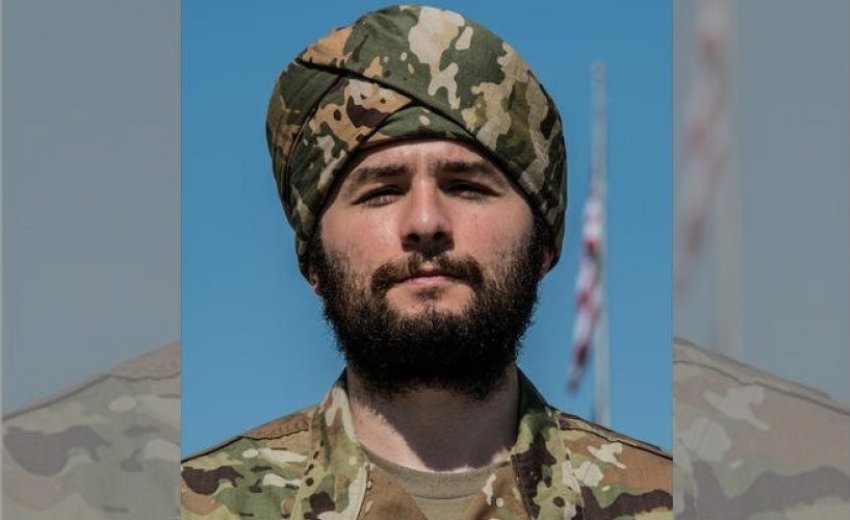Air Force Special Operations Command has made history by granting a religious accommodation waiver to a Sikh service member. This is the first time the command has done so. According to a statement from the Air Force, Senior Airman Dominic Varriale was granted the turban waiver in 2020. At the time, he was currently assigned to the 11th Special Operations Intelligence Squadron where he worked as a geospatial intelligence analyst.
The announcement claims that with the assistance of his command leadership and the Sikh American Veterans Alliance (SAVA), an advocacy group, Varriale was able to speed up the approval process from three years to three months.
Varriale, of Long Branch, New Jersey, shared his experience and said that he was sent Air Force instruction-approved religious articles of faith, a camouflage pattern-coloured turban. The management also allowed him to speak to his gurudwara and get a proper letter of sincerity.
Turban waiver: A welcome move
Commander of the 11th SOIS, Lt. Col. Brian Lightsey, stated that Varriale welcomed the news when he learned of the approval on June 7, 2020. He further said that Varriale’s reaction was immediate. One could see a sense of relief, a sense of pride, but most importantly, it was clear that this waiver meant a great deal to him.
“Senior Airman Varriale was always a capable analyst beforehand, but I sincerely believe the practising of his faith has provided the extra motivation to hone his craft as a mission analyst and to improve as an airman.”
Varriale expressed gratitude for the support provided by the leadership. For a significant portion of history, the military had a more "mind your own business" mentality. People have been considerably hesitant about asking questions about Varriale’s religion. However, this changed with the increased emphasis on diversity. They are no longer afraid to ask questions about his religion and learn about it.
The Air Force modernised its clothing and appearance code in February 2020. They established a a comprehensive process for airmen to request waivers for religious apparel such as hijabs and turbans as well as facial hair that is worn for religious reasons. The revised regulation stipulates that all airmen must have a "neat and conservative" appearance at all times.
Prior steps taken to offer religious waivers
In 2014, the Pentagon issued a guideline describing how religious service members might ask for a waiver to wear otherwise-prohibited items, such as a turban, headscarf, or beard, in order to demonstrate their "sincerely held views." The policy indicates that such accommodations will be granted on a case-by-case basis and may be denied if the request is deemed to interfere with the wearing of a uniform or helmet or pose a health or safety risk.
Since then, the Army has led the services in granting religious personnel allowances. In 2017, the process for Muslims and Sikhs to acquire exemptions to wear beards, turbans, and other religious headwear was streamlined. While troops are needed to obtain authorization from their brigade on a case-by-case basis, once accepted, waivers are now permanent throughout the soldier's career.
Over the years, the Air Force has given numerous religious exemptions. In November 2019, officials told Military.com that the service had just authorised a sixth airman for a waiver based on his Muslim beliefs. It was granted to Staff Sgt. Abdul Rahman Gaita of the 821st Contingency Response Support Squadron at Travis Air Force Base in California.
Symbols of Sikhism being accepted by Forces
According to another release, several weeks earlier, Airman Sunjit Rathour graduated from the Security Forces technical training at Joint Base San Antonio, Lackland. He was the first Sikh airman to secure a full religious accommodation, starting at Basic Military Training through Security Forces Apprentice Course, to wear a turban and remain unshaven in uniform. He was also given permission to observe the rituals of his Sikh faith by wearing a chain and bracelet.
In June of 2019, in accordance with Air Force regulation, Airman 1st Class Harpreetinder Singh Bajwa, who served as an active-duty crew chief at Joint Base Lewis-McChord in Washington, was also given the same religious accommodation. In addition, Captain Maysaa Ouza, a Muslim woman who served in the JAG Corps was granted permission to wear a hijab in 2018.
The decision made by AFSOC was met with praise from The Sikh Coalition, an organisation that advocates for Sikh service members. In a statement to Military.com, the group said,
“No Sikh American should ever have to choose between their faith and career. It's important to see Senior Airman Dominic Varriale become another proof-positive case study that Sikh articles of faith do not pose barriers and another meaningful step toward further ensuring equality of opportunity and religious freedom in the Air Force.”
Varriale’s commitment towards Sikhism
During a trip to New Orleans in 2018, Varriale was introduced to the Sikh faith. His father was an Army warrant officer who worked as a medical evacuation pilot and in military intelligence for 14 years. Growing up in a military family inspired him to join the service. Varriale shared his experience with Sikhism, saying,
“The Sikh values and religion are anti-tyranny and anti-oppression. Good morals are a huge principle within Sikhism, and the Air Force has only doubled down on it through our core values. Nothing I do religiously gets in the way of my job, which is the American way.”
The Sikh community is gradually gaining acceptance from other religions, and cultures, especially in foreign lands. The turban waiver is a big step that will motivate followers of Sikhism to keep up with their cultural practices and symbols of faith.
*Based on an article by Oriana Pawlyk, published in Military.com on 30th July 2020
